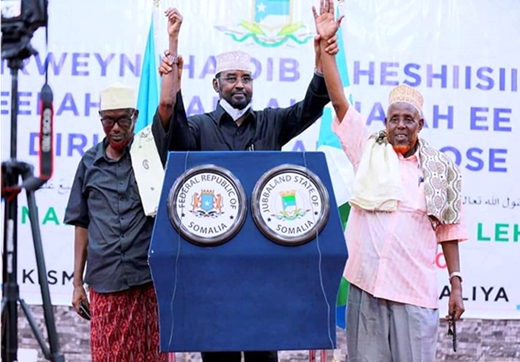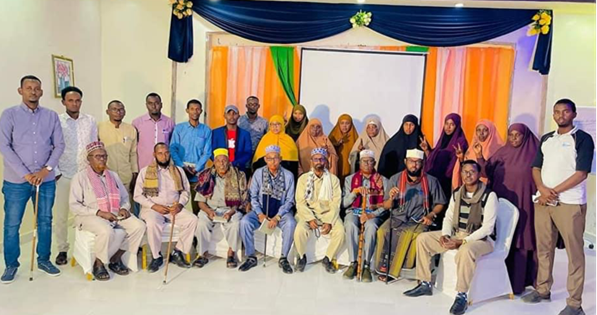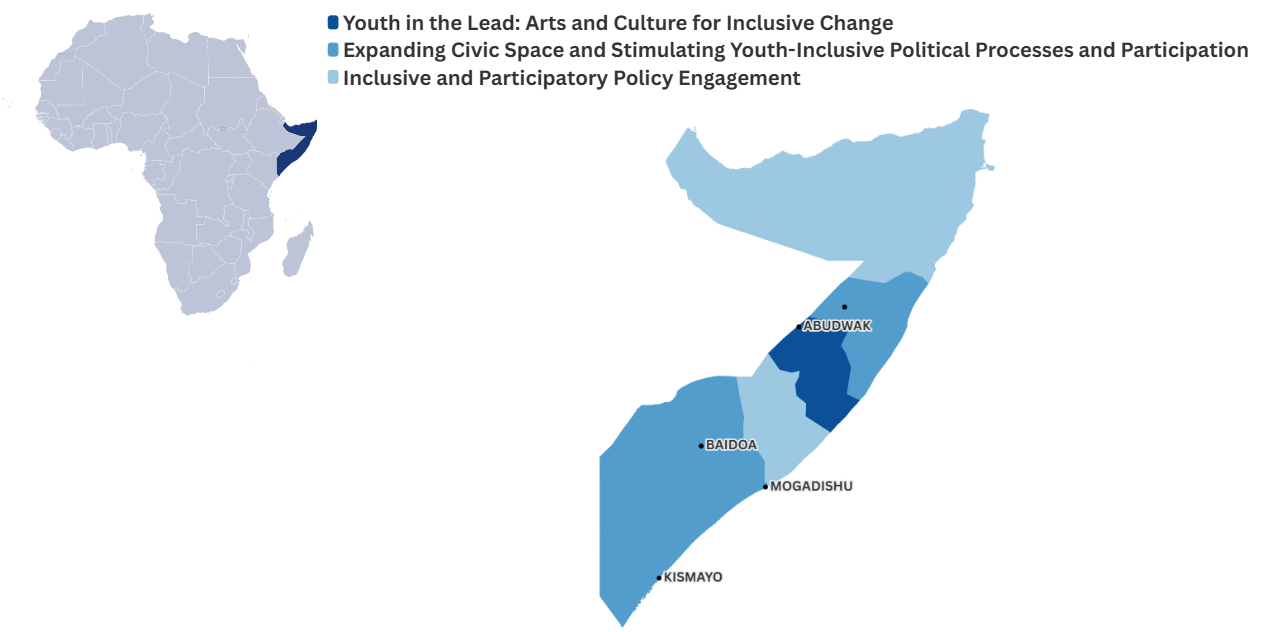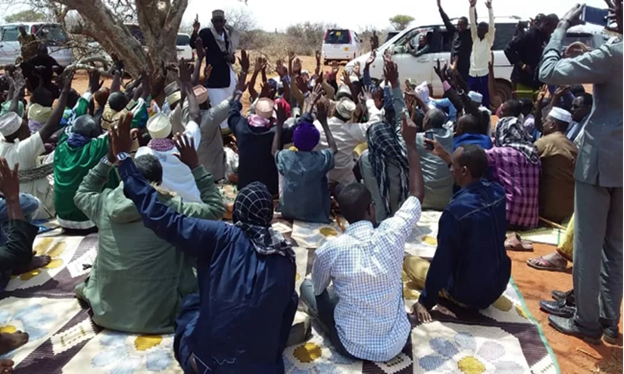Somalia
Our programme in Somalia
The situation in Somalia remains fragile with an entrenched conflict between al-Shabaab and government authorities, and intra and inter-communal tensions simmering across the country. Since 2022, government forces have led a major offensive against al-Shabaab in the central areas of the country: Galgudud, Hiran, and Middle and Lower Shabelle. The threat posed by al-Shabaab remains high in these newly liberated areas, as an al-Shabaab counter-offensive builds up momentum and stalls government´s advances. Armed forces from neighbouring countries, and African Union (AU) troops, remain engaged in the fight against the group. At the local level, intra and inter-communal conflicts, including land disputes, cattle rustling and revenge killings, have reignited due to rising tensions between security forces, clan/ethnic militias and local communities. Mediation efforts have been set up by the government, complemented and supported by civil society actors, in an effort to normalise relationships between rival clans.
At the regional level, relations between Somalia and Ethiopia have rapidly deteriorated with the signature of a Memorandum of Understanding (MoU) between Ethiopia and Somaliland in January 2024 over Ethiopia’s access to the Gulf of Aden. Contributing to the tensions is also Somalia’s signing of an agreement with Egypt and Turkey to bolster regional security and strengthen Somalia’s ability to control its territorial waters.

LPI in Somalia
LPI has facilitated conflict long-term transformation processes in Somalia since the early 1990s. Since 2010, in collaboration with key civil society partner organisations, we have contributed to reconciliation efforts at the national level, complementing internationally supported state-building and stabilisation efforts. In parallel, we also have worked with communities in newly formed Federal Member State (FMS) administrations and in areas not controlled by the Federal Government of Somalia (FGS).
During the 2017-2019 programme cycle, we made critical progress towards positively transforming conflict systems in Somalia. In collaboration with our partners, we successfully convened clan-based actors in dialogue processes that reduced violent events and secured numerous bottom-up peace agreements. These efforts have also resulted in the creation of inter-clan peacebuilding platforms, which over time has seen the increased involvement and participation of women and youth. Policy engagement has also ensured the involvement of local authorities in these local peace and dialogue processes, boosting mutual trust and their legitimacy.
Between 2020 and 2023, we implemented the ‘Multi-Level Conflict Transformation in South Central Somalia’ programme. Building on successes from the previous programme cycles, we continued our support to intra and inter-clan dialogue-to-action processes. Peace agreements, involving the demobilisation of clan militias, resource-sharing arrangements, the payment of diya [blood money], and the opening of roads boosted trust between neighbouring communities. During the programme, 17 community peacebuilding platforms were formed, revitalised or supported in their daily peace work. In response to severe droughts, we worked with our long-time partner Zamzam Foundation on the conflict-sensitive provision of life-saving humanitarian support (food, cash and water) for a humanitarian response that also contributed to conflict prevention.

Our work
Within our current country strategy for 2025-2027, learning remains a fundamental priority, encompassing a commitment to regularly updated conflict analyses, to consistent knowledge generation and to efforts at countering digital misinformation. The strategy focuses on five pillars of work that align with LPI´s strategic priorities:
Pillar 1: Cohesive, inclusive civil society promoting civic space
Based on existing initiatives and efforts, we seek to expand existing advocacy networks and enhance civil society capacity to engage in policy influencing. Under this pillar, support to civil society will take the form of both social cohesion initiatives such as dialogue processes, and of financial support through small grants for emerging community-based organisations (CBOs).
Pillar 2: Reconciliation and local peacebuilding
We seek to strengthen reconciliation processes at all levels by supporting multi-modal dialogues and participatory action research processes. In particular, we seek to provide opportunities for reconciliation between Internally Displaced Persons (IDPs) and host communities, and building on our work on intergenerational dialogues that leverage arts and culture. These reconciliation efforts will be complemented by a focus on strengthening communities’ and local partners’ capacity to quickly implement crisis interventions.
Pillar 3: Local authorities value and engage with peacebuilding
We seek to support knowledge creation on governance and state-building in Somalia, and enhance government capacities in peace agreement implementation and conflict sensitive approached towards improving citizen-state relationships and mutual trust.
Pillar 4: Triple nexus and multi sectoral engagement
We seek to create, support and participate in cross-mandate networks and alliances. In particular, we strive to work with local actors (civil society, think tanks, policy influencers, universities) and selected advocacy targets to boost our policy engagement efforts and ensure the complementarity and added value of peacebuilding actors across Somalia. Along these lines, we intend to improve conflict-sensitivity across all sectors by providing training and expertise to aid actors operating in the country, and carry out climate security related research and activities.
Pillar 5: Policy engagement at various levels: national, regional and international avenues.
We seek to connect with existing policy initiatives at all levels to promote bottom-up peace initiatives and support CSO’s engagement with authorities. In particular, we are engaging with the National Reconciliation Framework (NRF), the African Union Transitional Justice Policy (AUTJP), and the African Union Policy Framework (AUPF) for Pastoralism. This fits within the broader policy efforts of LPI’s Horn of Africa Programme (HARP) and of other LPI offices across the region. Currently, we are implementing two EU-funded initiatives in line with our strategic pillars for Somalia:
Inclusive and Participatory Policy Engagement for Peace and Reconciliation in Somalia is an initiative in partnership with Somali Public Agenda (SPA) that seeks to harmonise bottom-up policy engagement efforts and to develop a coordinated implementation plan for the NRF.
Youth in the Lead: Arts and Culture for Inclusive Change is a three-year initiative implemented in partnership with Somali Peace Line (SPL) that leverages the Sustained Dialogue methodology and a multi-dimensional approach for social cohesion through arts, culture and sports.
Expanding Civic Space and Stimulating Youth-Inclusive Political Processes and Participation in Somalia is a two-year initiative implemented in partnership with SPL and three youth-led local CSOs that seeks to expand youth civic space at the local level in an effort to promote peace, trust, community cohesion and governance.

Partners are key to our success
LPI has partnered for many years with a small group of very well connected and respected partners. A key focus has been on the quality of relationships and on mutual trust, valuing each partner’s unique strengths and added value for a greater impact. LPI has also had a crucial role in the setting up of the National Reconciliation Framework Civil Society Network that gathers around 20 CSOs from various Federal Member States of Somalia. In a highly fragile context where there is deep-seated mistrust, the symbolism and significance of working with diverse and multiple partners must not be underestimated. LPI’s partnership approach in Somalia entails a commitment to joint design, planning, and varying degrees of accompaniment in implementation.
Current programme partners
Peace & Development Forum (PDF) PDF is a youth-led organisation founded in 2017 with the mission of fostering peace, reconciliation, and development in Somalia. Recognized by government authorities and international partners, PDF actively facilitates dialogue, mediates disputes, and promotes peaceful solutions to the country's ongoing conflicts.
Somali Girls Rights Development Organisation (SGRDO) SGRDO is a local non-profit, non-governmental, and non-sectarian organisation, created, staffed, and managed by Somali professionals. It was founded in August 2019 by a group of intellectuals from the Baidoa District in consultation with representatives of communities from the Bay and Bakol regions. SGRDO's vision is a future where all Somali women and girls are viewed and treated equally, are able to sustain themselves, are respected and truly empowered, and where their contributions are recognized.
Somali Peace Line (SPL) SPL, or ‘Tubta Nabadda’ [the way to peace], was founded in 1995, with the ambition to consolidate a ’home-grown’ peace movement and support Somalia’s civil society in achieving peace. LPI’s partnership with SPL is our longest in the country, stretching back to 2008. Whilst much of SPL’s focus over the years has been on supporting the traditional peacebuilding role of clan elders, recent efforts have shifted focus to engaging women and youth in peacebuilding and dialogue processes.
Somali Public Agenda (SPA) SPA is a Somali non-profit public policy and research organisation based in Mogadishu. SPA's aim is to ensure Somali citizens can access public services that are responsive, evidence-based, and inclusive. SPA is a respected and neutral policy institution with experience engaging Somali and international policy actors through in-depth participatory research methods. SPA regularly conducts policy consultations, and convenes CSO actors and Somali government officials.
Somali Youth Leaders (SYL) SYL was founded in 2020 by a diverse group of young professionals who recognized the urgent need to empower and guide Somalia’s next generation of leaders. Its mission is to engage young Somalis in addressing environmental issues and to foster their active, informed participation in civil and political life. Its work focuses on four main areas: developing leadership skills, providing quality information on key issues with an emphasis on climate change, promoting youth physical and mental health, and supporting peace and stability across Somalia.


Our donors
Donors and organisations who have supported our work in Somalia over the past decades include: the European Union, the Somalia Stability Fund (SSF), the Norwegian Ministry of Foreign Affairs, the Swedish International Development Cooperation Agency (Sida), the Swedish Institute and the United Nations Peacebuilding Fund (UNPBF).
Read more about LPI's donors on the funding & finance page.
Resources
More resources are available in the Publications & Reports page of our website and in our flagship publication: the Horn of Africa Bulletin.
Related articles & resourcesSomalia
LPI's Somalia programme is administered from the office in Nairobi, Kenya.
Postal Address
Life & Peace Institute, P.O. Box 64495-00620, Nairobi, Kenya
Visiting Address
Mpaka Road, Nairobi/Mogadishu, Somalia
Phone +254 (0) 20 4440433
